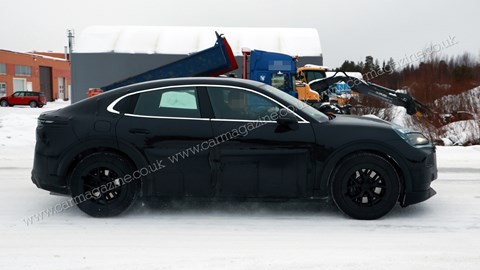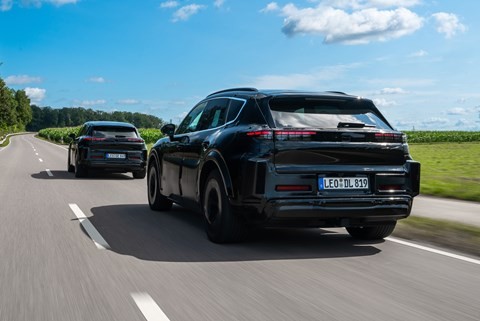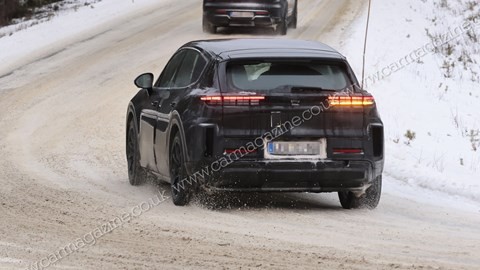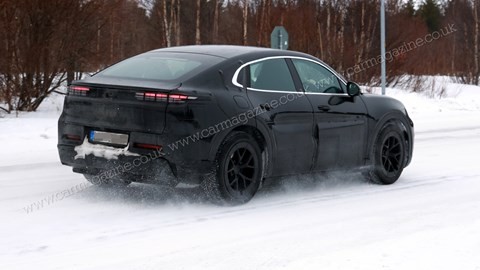Porsche has officially announced the all-electric version of its iconic Cayenne SUV, set to debut in 2025. This fourth-generation Cayenne will be exclusively electric, marking a significant step in Porsche’s electrification strategy. Extensive testing is underway, with engineers putting prototypes through rigorous trials to ensure it lives up to the Porsche name.
As previewed in early testing models, the electric Cayenne will adopt a similar pill-shaped headlight design seen on the electric Macan, indicating a new visual direction for Porsche’s EV lineup. This move signals Stuttgart’s commitment to a distinct design language for its electric vehicles.
 Porsche Cayenne electric car side profile
Porsche Cayenne electric car side profile
The strategic approach Porsche is taking with the Cayenne is particularly noteworthy. The upcoming fourth generation will be solely electric, built upon the Volkswagen Group’s Premium Platform Electric (PPE) architecture. This platform is also the foundation for the electric Macan, as well as Audi’s Q6 e-Tron and the future A6 e-Tron models. Utilizing the PPE platform highlights Porsche’s commitment to leveraging shared technology for its electric SUV range.
 Front view of the electric Porsche Cayenne prototype
Front view of the electric Porsche Cayenne prototype
Porsche emphasizes that the PPE platform will undergo “comprehensive further development” specifically for the new Cayenne EV. It will retain the 800-volt architecture for rapid charging capabilities, and these enhancements suggest potential improvements in battery capacity and overall performance compared to other vehicles currently using the platform. This focus on platform evolution underscores Porsche’s dedication to pushing the boundaries of EV technology in its high-performance SUVs.
Interestingly, the current third-generation Porsche Cayenne will continue to be produced and sold alongside the all-electric model. Porsche has confirmed that the existing Cayenne will receive further upgrades, including a refined V8 engine, ensuring it meets future emissions standards. Plug-in hybrid versions will also remain available. This dual-offering strategy reflects a nuanced approach to the transition to electric vehicles, catering to a broader range of customer preferences and market demands.
 Current generation Porsche Cayenne interior
Current generation Porsche Cayenne interior
This strategy aligns with a broader industry trend of automakers adjusting their electrification timelines in response to evolving market conditions. Factors such as fluctuating demand and adjusted emissions regulations in certain regions have prompted some manufacturers to re-evaluate their EV transition plans. Audi, for example, has indicated plans to continue offering combustion engine vehicles for a longer period than initially anticipated.
While acknowledging these market dynamics, Porsche reaffirms its strong commitment to electromobility. Oliver Blume, CEO of Porsche AG, stated that their product strategy aims to achieve over 80 percent of new car sales as fully electric vehicles by 2030. However, this target remains dependent on customer demand and the overall progress of electromobility across different global markets.
 Rear view of Porsche Cayenne Coupe Electric model
Rear view of Porsche Cayenne Coupe Electric model
The launch of the all-electric fourth-generation Cayenne in 2025 is part of Porsche’s expanding SUV portfolio. Alongside the new electric Macan and this strategic approach to the Cayenne, Porsche has also confirmed plans for a new flagship electric SUV, codenamed K1, slated for release in 2027. This ambitious product roadmap underscores Porsche’s dedication to establishing a strong presence in the electric SUV market while maintaining its performance heritage.